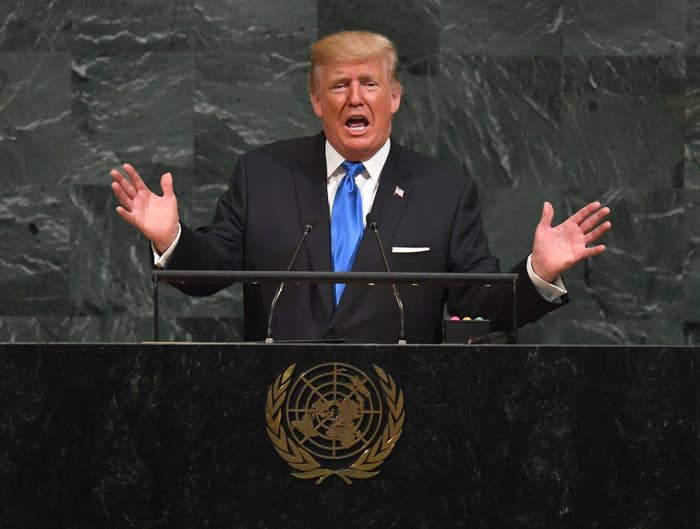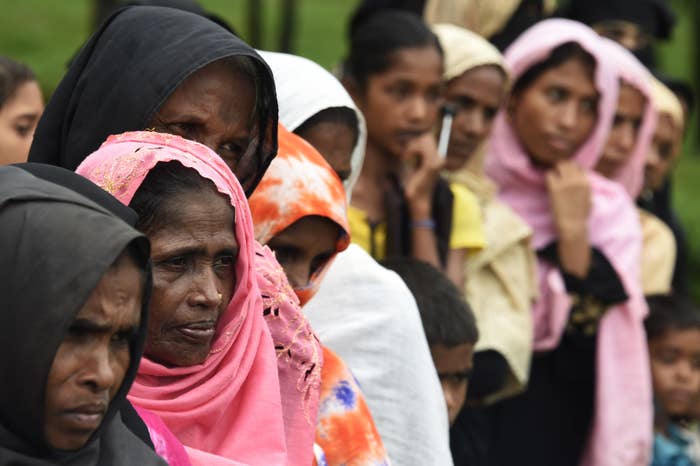
Donald Trump’s speech before the United Nations earned attention primarily for his threat to “totally destroy North Korea” and his questioning of the Iran nuclear deal, which he called a deep embarrassment to the United States.
But for human rights advocates around the world, it was the philosophy he expressed that was most alarming, the idea that every nation should do what it considers to be in its best interests. It was a pivot away from what has been the US position for over a half-century, that the way to global peace and prosperity lies in international rules and cooperation.
The rhetorical shift put the Trump worldview more in line with the governments of China and Russia than any previous US president since World War II, said analysts.
“For years, Beijing and Russia have argued that sovereignty trumps human rights,” said Richard Gowan, a UN expert at the European Council on Foreign Relations. “Now, when some hard-working American diplomat raises Myanmar or another humanitarian crisis, the Chinese and Russians will just say that they share President Trump's belief in the primacy of sovereignty.”
That worried human rights experts who see international institutions as key advocates for universal values.
“What's particularly concerning is the fact that President Trump seems to think that people have interests and nation-states have rights – a concerning indication of a foreign policy that prioritizes the will of the majority and could be used as a shield from scrutiny and transparency,” said Sarah Margon, the Washington director at Human Rights Watch.
Trump made it clear that each country should feel free to do what it feels is best for its people and its culture.
“I will always put America first,” he said. “Just like you should always put your countries first.”
"The nation-state remains the best vehicle for elevating the human condition," Trump said.
The challenge, say human rights activists, is when nation-states fail to protect vulnerable populations within their borders or actively target them.
In Myanmar, for instance, some 420,000 Rohingya have fled to Bangladesh to escape what the United Nations is calling ethnic cleansing. In Uganda, homosexual acts are punishable by prison sentences and LGBT people have been killed or tortured for their sexual preferences. In the Central African Republic, clashes between Muslim and Christian militias have resulted in thousands of deaths.

In such cases, where the respective government has little domestic political incentive to address the human rights abuses in question, activists argue that the situation won’t improve absent outside international pressure. They say any potential compromises of sovereignty the US may have to make through its membership of international organizations pale in comparison to the benefits of helping set international standards for the better treatment of people around the world.
“Trump spoke fiercely about America’s sovereignty. However, it’s not America’s sovereignty that is in question, but rather America’s leadership on the world stage,” Oxfam America’s president, Abby Maxman, said in a statement.
The United States continues to play a role in setting these standards through annual reports issued by the State Department on human trafficking, press freedoms, religious discrimination, and mass atrocities around the world. Often, authoritarian countries such as Russia and China are called out in these reports for issues such as press censorship or discrimination against LGBT people. Moscow and Beijing have criticized such reports as meddling in their internal affairs and a violation of their sovereignty. Trump’s speech could neuter the impact of such reports.
“Trump's emphasis on sovereignty was a gift to China, Russia, and other non-Western members of the UN,” Gowan said.
The idea that nation-states are the preeminent actors in world affairs is not a novel concept. The concept of melding a state around a people has been central to political science since the 19th century.
But Trump’s emphasis on the sovereignty of individual nations to act as they see fit went further.
In his remarks, the president uttered the word “sovereign” and its variations 21 times.
His main disdain for international institutions and multilateral agreements was reflected in his withering criticisms of the Paris climate accord and the Iran nuclear deal.
“The Iran deal was one of the worst and most one-sided transactions the United States has ever entered into,” he said. “Frankly, that deal is an embarrassment to the United States.”
But Trump’s remarks went beyond criticizing deals he doesn’t agree with. He repeatedly argued that humanity is better off with strong nations as opposed to strong international institutions.
"Our success depends on a coalition of strong and independent nations that embrace their sovereignty, to promote security, prosperity, and peace for themselves and for the world," he said.
Notably, Trump’s respect for sovereignty did not seem to apply to his dealing with US adversaries in North Korea, Venezuela, and Iran, which he has repeatedly threatened, and in the case of North Korea and Venezuela, he raised the spectre of a military intervention.
Trump put those countries in a separate box of “rogue regimes that violate every principle on which the United Nations is based.”
“They respect neither their own citizens, nor the sovereign rights of other countries,” Trump said.
Whether Trump can coerce those regimes without the help of international institutions and multilateral agreements remains to be seen.
